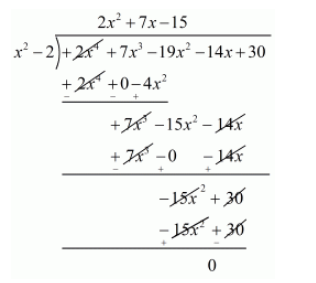Find all zeros of the polynomial $2 x^{4}+7 x^{3}-19 x^{2}-14 x+30$, if two of its zeros are $\sqrt{2}$ and $-\sqrt{2}$.
We know that if $x=\alpha$ is a zero of a polynomial, and then $x-\alpha$ is a factor of $f(x)$.
Since $\sqrt{2}$ and $-\sqrt{2}$ are zeros of $f(x)$.
Therefore
$(x+\sqrt{2})(x-\sqrt{2})=x^{2}-(\sqrt{2})^{2}$
$=x^{2}-2$
$x^{2}-2$ is a factor of $f(x)$. Now, we divide $2 x^{4}+7 x^{3}-19 x^{2}-14 x+30$ by $g(x)=x^{2}-2$ to find the zero of $f(x)$.

By using division algorithm we have $f(x)=g(x) \times q(x)-r(x)$
$2 x^{4}+7 x^{3}-19 x^{2}-14 x+30=\left(x^{2}-2\right)\left(2 x^{2}+7 x-15\right)+0$
$2 x^{4}+7 x^{3}-19 x^{2}-14 x+30=(x+\sqrt{2})(x-\sqrt{2})\left(2 x^{2}+10 x-3 x-15\right)$
$2 x^{4}+7 x^{3}-19 x^{2}-14 x+30=(x+\sqrt{2})(x-\sqrt{2})[2 x(x+5)-3(x+5)]$
$2 x^{4}+7 x^{3}-19 x^{2}-14 x+30=(x+\sqrt{2})(x-\sqrt{2})(2 x-3)(x+5)$
Hence, the zeros of the given polynomial are $-\sqrt{2},+\sqrt{2}, \frac{+3}{2},-5$.
Click here to get exam-ready with eSaral
For making your preparation journey smoother of JEE, NEET and Class 8 to 10, grab our app now.
